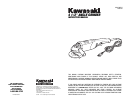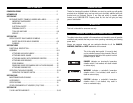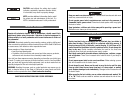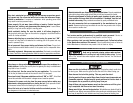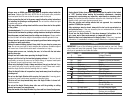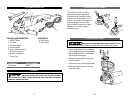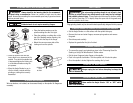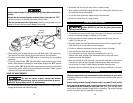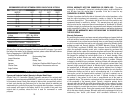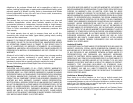
WORK AREA
Keep your work area clean and well lit. Cluttered work benches and dark work
areas may cause accidents or injury.
Do not operate power tools in explosive areas, such as in the presence of
flammable liquids, gases or dust. Power tools create sparks which may ignite
the dust or fumes.
Keep bystanders, children and visitors away while operating a power tool.
Distractions can cause you to lose control.
ELECTRICAL SAFETY
Double insulated tools are equipped with a polarized plug (one blade is
wider than the other.) This plug will fit in a polarized outlet only one way. If
the plug does not fit fully in the outlet, reverse the plug. If it still does not fit,
contact a qualified electrician to install a polarized outlet. Do not change the
plug in any way. Double insulation eliminates the need for the three wire
grounded power cord and grounded power supply system.
Avoid body contact with grounded surfaces such as pipes, radiators, ranges
and refrigerators. There is an increased risk of electric shock if your body is
grounded.
Do not expose power tools to rain or wet conditions. Water entering a power
tool will increase the risk of electric shock.
Do not abuse the cord. Never use the cord to carry the tool or pull the plug
from an outlet. Keep the cord away from heat, oil, sharp edges, or moving
parts. Replace damaged cords immediately. Damaged cords increase the risk
of electric shock.
When operating the tool outside, use an outdoor extension cord marked “W-
A” or “W.”These cords are rated for outdoor use and reduce the risk of elec-
tric shock.
4
CAUTION used without the safety alert symbol
indicates a potentially hazardous situation which,
if not avoided, may result in property damage.
NOTE provides additional information that is useful
for proper use and maintenance of this tool. If a
NOTE is indicated make sure it is fully understood.
IMPORTANT SAFEGUARDS
People with electronic devices, such as pacemakers, should consult their
physician(s) before using this product. Operation of electrical equipment in
close proximity to a heart pacemaker could cause interference or failure of
the pacemaker.
WARNING: Some dust created by power sanding, sawing, grinding, drilling and
other construction activities contains chemicals known to the State of California
to cause cancer, birth defects or other reproductive harm.
Some examples of these chemicals are:
• Lead from lead-based paints.
• Crystalline silica from bricks and cement and other masonry products,
and arsenic and chromium from chemically-treated lumber.
Your risk from these exposures varies, depending on how often you do this type
of work. To reduce your exposure to these chemicals: work in a well ventilated
area, and work with approved safety equipment, such as dust masks that are
specially designed to filter out microscopic particles.
WARNING: Handling the power cord on corded products may expose you to
lead, a chemical known to the State of California to cause cancer and birth
defects or other reproductive harm.
Wash hands after handling.
SAVE THESE INSTRUCTIONS FOR FUTURE REFERENCE.
3



